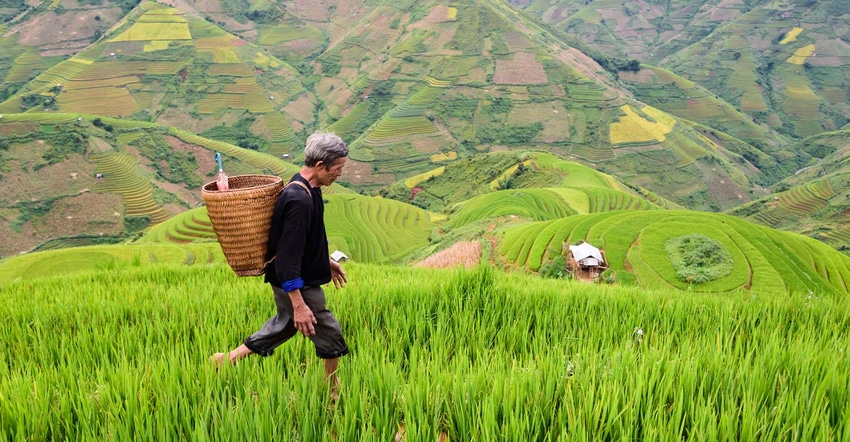
by Bloomberg News
As China’s policy makers work to reform how farmland is held--don’t call it ownership--they must overcome low productivity, high costs, and an aging rural population, according to a senior U.S. Department of Agriculture economist who’s studied the sector for two decades.
The decades-old collective landholding system needs an overhaul to modernize the agricultural industry, said Fred Gale, a senior economist for China at the USDA’s Economic Research Service in Washington.
Land in China belongs to the state or collective; farmers contract to use it without owning it. Reforms would allow rural land to be more easily transferred or leased to companies, as well as be used as collateral for loans. While trials to encourage a more robust land rental market and farm consolidation are underway, privatization remains off limits.
“The landless peasant thing is something that comes up often" when officials discuss privatizing land, Gale said.
That’s no small consideration for a country with an official rural population of 590 million. China’s agricultural economy, or primary sector, accounted for 8.6% of output last year, down from about a third in the early 1980s, and has been expanding at roughly half the pace of overall gross domestic product.
Following are edited excerpts from a recent interview in Beijing:
Empty Villages
Question: Why land reform now, and why is landholding consolidation a key goal?
Answer: There’s an urgency to overhaul the farming system because they see the villages are emptied out of young and skilled people, and the people left are elderly and less skilled. One of the big themes is to try to raise productivity because officials realize agricultural products are expensive and uncompetitive, and that is attracting imports. So pressure to reform the land is coming from a combination of short-term pressure, because imports are cheaper than China’s products, and the long-term question of who will be our farmers.
Q: Why has progress been slow?
A: This goes back to the third plenum of the 17th Party Congress in 2008, where there was a lot of anticipation that China would privatize land. But it was really kind of a tentative step and wasn’t a privatization: it was the leaders saying it’s OK to trade land or rent out or lease or sub-lease land to other farmers. They started trying to issue land certificates and delineate where boundaries are.
City authorities worry about getting inundated by rural migrants. So the strategy has been to try to create small towns to absorb the rural population so they don’t flood the cities and overwhelm the social welfare system.
Broken Contracts
Q: Why have we seen problems with contracts?
A: When grain prices were high, farmers were willing to pay the rent, but when prices fell, there was a lot of talk about farmers wanting to give up the land or renege on the contracts.
Another big initiative has been to try to vertically integrate farmers with processors and trading businesses, through contracts and relationships where they agree to supply a certain volume to the processor at a certain price. Both sides will often break contracts depending on price moves. If the price goes up, farmers may break the contract and sell into the open market; if the price goes down, the processor may renege.
Q: To what degree are old socialist institutions relied on for reform today?
A: China is carrying out market-oriented reforms, but they still want to keep institutions like the rural collectives and collective ownership of land. Those institutions are really kind of a creature of subsistence farming. They were created based on a village where everybody is fixed in place and they distribute land among the people. That’s not necessarily compatible with a dynamic market economy, where you need to be able to trade assets and shift assets to their best value.
China is kind of trying to meld these two different things, these socialist institutions with the market economy. On one hand you could think of that being adventurous and innovative, but it remains to be seen if you can really do that and have a thriving economy.
Big Companies
Q: Why choose a state-led effort, relying on big agricultural companies?
A: China thinks they need to have big companies that are competitive with multinationals, especially in grain trading. But there’s also kind of an infant industry idea: it’s assumed that these companies need subsidies to get started, they need government help, and once they get momentum they’ll become competitive and acquire other companies.
China’s approach is more top down. They think there needs to be big, national champions at the top and they can pull along people the bottom. For 20 years they’ve had development where the government gives support: they identify strong agribusiness companies that can help. There’s this implicit bargain where they’ll get some help from the government, then this strong company will contract with peasant farmers, pull them among, give them technical advice, give them a market for their products. It’s a very controlled, engineered approach to economic development.
Q: Do the government’s food security worries affect or slow the reform process?
A: China sees food security at the national level but also at the individual level. The land has always been viewed as food security and economic security for the family as well. That’s basically carrying over the traditional idea of a subsistence farming economy. That’s really becoming anachronistic as this becomes a first-world economy, where everything is traded and specialized, and you’re trying to maintain this legacy.
--With assistance from Niu Shuping.
To contact Bloomberg News staff for this story: Dexter Roberts in Beijing at [email protected]
To contact the editors responsible for this story: Jeffrey Black at [email protected]
Phoebe Sedgman, Jeff Kearns
© 2017 Bloomberg L.P
About the Author(s)
You May Also Like




